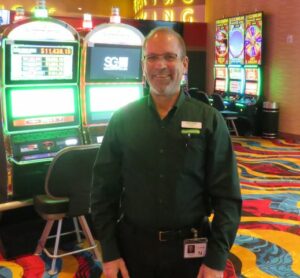By Brett Peruzzi, Contributing Writer

Photo/submitted
Region – Charlie Ordille spends many days and nights at Plainridge Park Casino in Plainville talking to gamblers. But he’s not a casino employee – he’s there to help people who may be struggling with a gambling disorder.
Ordille works for the Massachusetts Council on Compulsive Gambling, a private, nonprofit public health agency, which advocates for responsible gaming, gambling practices, and services for those affected by gambling. The council runs what they call GameSense Information Centers at the three state casinos: Encore Boston Harbor, MGM Springfield, and Plainridge Park Casino.
The centers offer on-site resources for casino patrons to find out more about the games or to take a break from playing. The staff are called GameSense Advisors and are funded by the Massachusetts Gaming Commission and are trained by the council.
“A GameSense Advisor can have between 50 and 70 patron conversations per shift,” explained Ordille. “The conversations can range widely in nature from a simple greeting, to explaining how the odds work on certain games, to providing advice on how to keep gambling fun, responsible, and avoid problem gambling behavior.”
And Ordille is intimately familiar with the environment he’s working in. He was employed for over 25 years as a casino manager, both at Foxwoods in Connecticut and Bally’s in Atlantic City, New Jersey. He became a GameSense Advisor in May 2019.
“I was approached by another former casino manager like myself who went to work for GameSense,” he recalled. “I had never heard of the program, as it was new to the state. He pitched it to me, and I thought this would not only be good for me personally but would be an opportunity to make a difference.”
The 61-year-old New Jersey native, who now lives in Connecticut, makes the long drive to Plainville because he is passionate about helping people, particularly seniors, avoid the pitfalls of a business that he knows only as a former insider could.
“Older adults may often be more vulnerable to problem gambling,” said Ordille. “Research shows that older adults tend to gamble to socialize, out of loneliness, boredom, to escape personal losses, to name a few reasons, and they have the free time to do so.”
Research estimates that approximately two percent of the Massachusetts adult population are problem gamblers. Problem gambling is characterized by gambling behavior which leads to adverse consequences for the gambler, others, and the community.
“Many people don’t know what compulsive gambling is, or that gambling is a real addiction, much like alcohol or drugs,” continued Ordille. “The term compulsive gambling is a bit antiquated and is now often called gambling disorder. Gambling disorder is the uncontrollable urge to keep gambling despite the toll it takes on your life.”
The GameSense Information Center is open at all three casinos 16 hours a day, from 9 a.m. to 1 a.m., 365 days a year. Ordille typically works the mid-day shift from 11 a.m. to 7 p.m. but also works mornings from 9 a.m. to 5 p.m. and evenings from 5 p.m. to 1 a.m.
“The type of patrons we engage with can range greatly depending on the casino property, day of the week and time of the day,” he explained. “The Plainridge Park Casino where I work tends to have older clientele during weekdays and a mix of young and old during the weekends. In the end, we’re trained to engage with patrons from all walks of life whether they be frequent gamblers or first timers from another country.”
Ordille stressed that the center staff comes well-prepared to their role, in addition to the training they receive from the council.
“Our GameSense team collectively between the three properties speaks six languages and has a strong background in the casino industry, so we’re very comfortable speaking with the guests on their terms and building their trust.”
Ordille offered this advice for gamblers.
“Keep it fun. It’s entertainment and certainly not a form of investment,” he emphasized. “Set a budget for yourself and keep to it. At Plainridge Park Casino we have a budgeting tool called ‘Play My Way’ that you can enroll in.”
“Once you’re enrolled,” he continued, “you’ll get automatic notifications after you approach 50 percent, 75 percent, and 100 percent of the budget you’ve set for daily, weekly, or monthly spending. You can choose to stop at any point or keep playing but it’s easy to lose track of time and money when you’re in the middle of playing.”
He also noted there is a program that allows you to voluntarily exclude yourself from the gaming floor of all Massachusetts casinos for a pre-determined amount of time.
“As a casino manager for many years,” he concluded, “I was in charge of generating revenue for the casinos, but now I’m solely focused on minimizing harm, helping those that really need it, and helping others keep it fun.”
The council also has a confidential 24-hour help line, 1-800-426-1234, that you can call to talk about a gambling problem. You can learn more about the Massachusetts Council on Compulsive Gambling and its programs at www.maccg.org.












